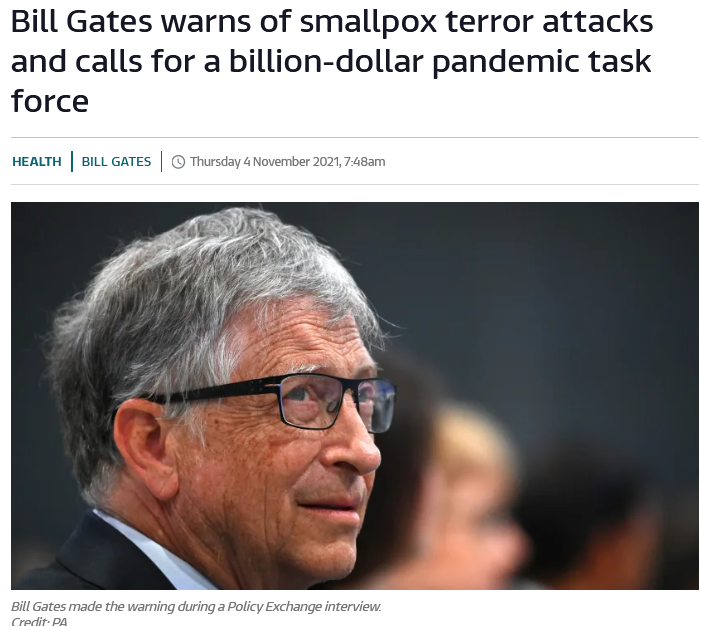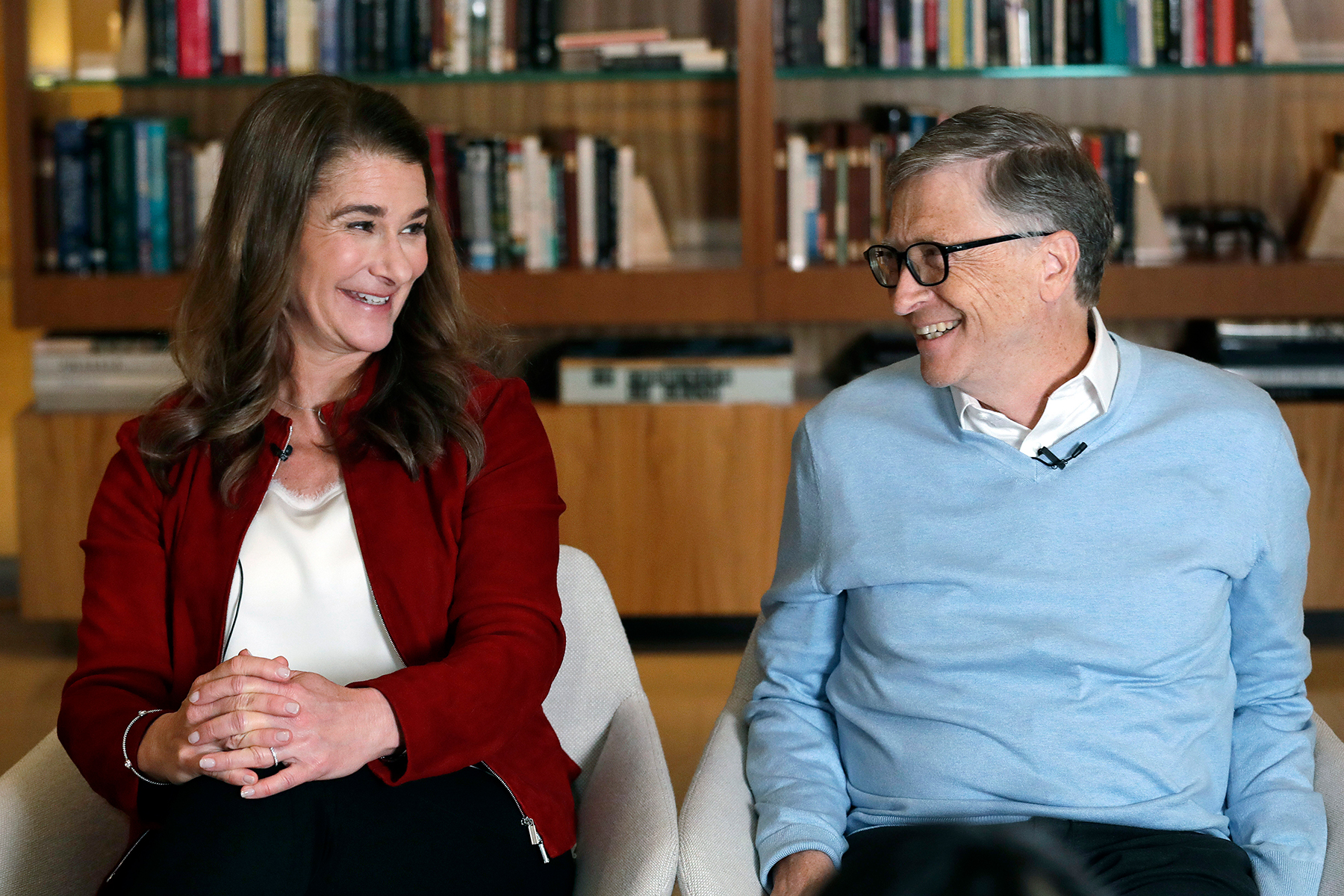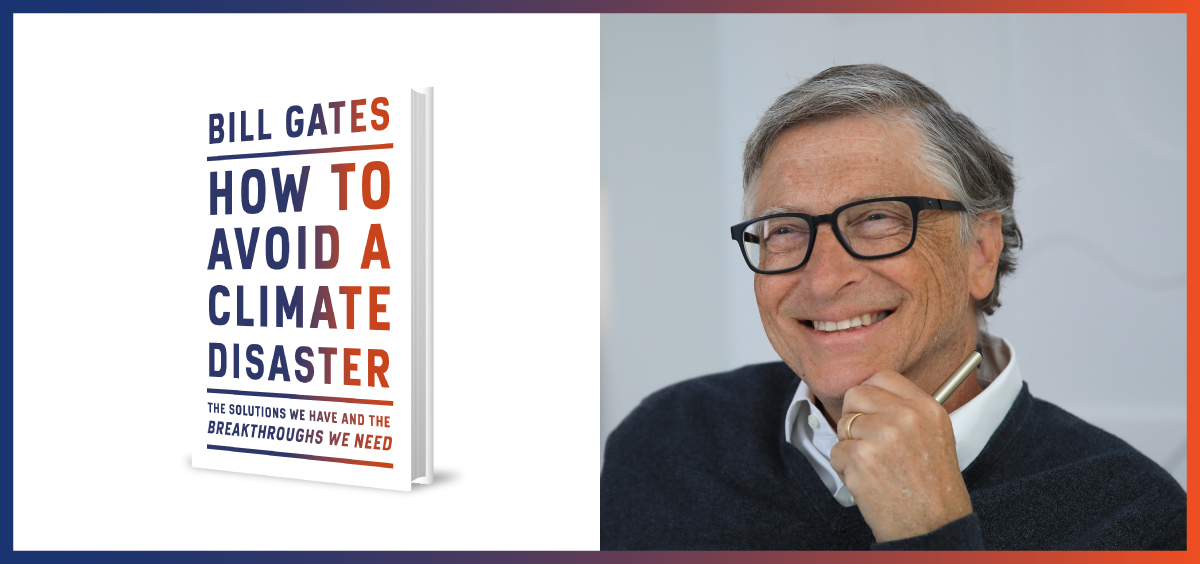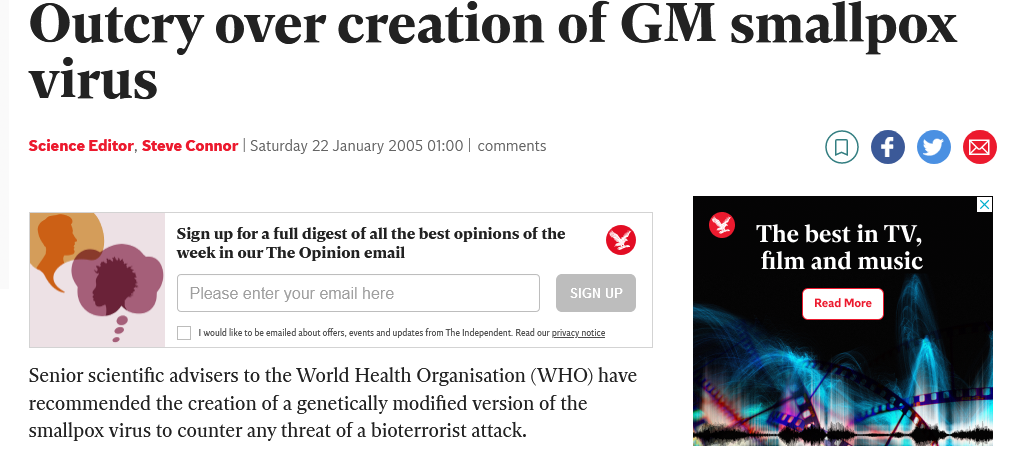Will a Pastel sweatered psychopath
open the Gates of Hell?
|
Scary!...woo...
|
Even scarier!
|
Fuck that Noise!
|
|
Scary!...woo...
|
Even scarier!
|
Fuck that Noise!
|
 |
In a TED talk in 2015, the Microsoft co-founder and billionaire philanthropist cited lessons learned from Western Africa's 2014 Ebola virus crisis, and said the U.S. and other countries were not prepared for the future pandemic that was going to hit them.
"If anything kills over 10 million people in the next few decades, it's most likely to be a highly infectious virus rather than a war," Gates said. "Not missiles, but microbes."
Gates noted that many countries worked for years to reduce the risk of nuclear war, and needed to give similar attention to a massive mobilization against a killer virus.
"We've actually invested very little in a system to stop an epidemic," he said, echoing warnings in recent years from infectious disease doctors. "We're not ready for the next epidemic."
|
|
Gates praised the "heroic work" by health care workers who went to Africa to help with the Ebola response. But in his March 2015 talk, he noted that there were not enough epidemiologists tracking the disease or sufficient doctors to treat patients, records were kept on paper instead of computers, and other major shortcomings hampered efforts. Society was lucky that outbreak — which killed more than 11,000 people in Liberia, Sierra Leone, and Guinea — mostly stayed in rural areas, he said, or it would have been much worse.
"The failure to prepare could allow the next epidemic to be dramatically more devastating than Ebola," he said. A virus "like the Spanish flu of 1918," Gates added, "would spread throughout the world very, very quickly. And you can see over 30 million people died from that epidemic. So this is a serious problem. We should be concerned."
Individual countries, the World Health Organization, and others need to create medical strike teams that train like military soldiers, run simulated pandemic exercises, and prepare to quickly move into areas where pandemics are starting to test and treat victims, he said. Governments also need to invest far more in medical equipment, vaccine research and other ways to prepare.
"Now I don't have an exact budget for what this would cost, but I'm quite sure it's very modest compared to the potential harm," Gates said. "The World Bank estimates that if we have a worldwide flu epidemic, global wealth will go down by over three trillion dollars and we'd have millions and millions of deaths."
"There's no need to panic," Gates said in closing. "We don't have to hoard cans of spaghetti or go down into the basement. But we need to get going, because time is not on our side."
Although he began his career as a computer programmer, Gates, 64, has devoted much of the last 20 years to public health and medicine.
The Bill & Melinda Gates Foundation, based in Seattle, is run by three trustees: Bill and his wife Melinda Gates, and financier Warren Buffett. Since it was established 20 years ago, the foundation has contributed more than $6 billion to medical research and health care, focusing on treatment and prevention of AIDS, tuberculosis, malaria, measles and other diseases, particularly in Africa and some of the poorest parts of the world.
|
Bill Gates is a smart guy who
knows something about global health?
 |

Bill Gates is a smart guy who knows something about global health. So when he gives a grave warning about a potential catastrophe, it's a good idea to listen. Yesterday, at the Munich Security Conference in Germany, the man who tops the Forbes richest person in the world list and is co-chair of the Bill and Melinda Gates Foundation said:
"Whether it occurs by a quirk of nature or at the hand of a terrorist, epidemiologists say a fast-moving airborne pathogen could kill more than 30 million people in less than a year. And they say there is a reasonable probability the world will experience such an outbreak in the next 10 to 15 years."
Notice that this was at a security conference and not a health meeting. Therefore, he could have focused on some other issue such as nuclear weapons or climate change. But Gates chose to focus on infectious disease threats (whether starting naturally or used as a bioterrorist weapon) for good reason. Our society is in need of a good wake-up call and slap in the face.
Forbes
|
 |
June 2020
With President Trump announcing
that the US will be "terminating" its relationship with the
World Health Organisation (WHO), the Bill and Melinda
Gates Foundation (BMGF) is set to become the biggest
funder of the organisation.
A private foundation becoming
the biggest funder, and hence the biggest influence, on a
United Nations agency would be a first.
In fact, though the WHO is meant to be a body accountable
to its members countries, among the top 10 donors to the
organisation only four are member countries and one is the
European Commission.
The rest are all non-state actors or
philanthropies. When the WHO was constituted, its
constitution stipulated that it should primarily be financed
through regular contributions from member countries,
called "assessed contributions", relative to the country's
wealth and population.
However, the reluctance of member
countries to increase the assessed annual contributions has
made it increasingly dependent on voluntary contributions
from countries and non-state actors, weakening its
autonomy.
|
"we'll have to prepare for the...
the...Next one...you know...i'd say - um...
that... WILL get attention this time"
 |
 |
|
Bill Gates famously warned about the risk of a pandemic in 2015, and in 2021 he offers ideas on vaccines and preparing for the next pandemic. Gates stresses that spending in advance is actually quite a "bargain" compared to the cost of reacting to a pandemic once it ravages the world and cripples the economy. Gates also discusses tech regulations, attacks on him and Dr. Fauci, systemic racism, tax policy and his reaction to being cited in so many rap songs, in this debut of The Summit Series, a collection of in-depth interviews with leaders at the summit of their fields by MSNBC's Ari Melber. Aired on 01/28/2021. |
 |
Bill Gates has warned that governments must prepare for future pandemics and smallpox terror attacks by investing billions in research and development.
Mr Gates made the warning during a Policy Exchange interview with the chair of the Health Select Committee Jeremy Hunt.
The Microsoft founder also called for the formation of a new billion-dollar World Health Organisation Pandemic Task Force.
While the research may be expensive, he said that it could also lead to other innovations, such as eradicating flu and the common cold.
He said that countries like the US and the UK must spend "tens of billions" to fund the research.
"I'm hoping in five years, I can write a book called, ‘We ARE ready for the next pandemic', but it'll take tens of billions in R&D – the US and the UK will be part of that", he said.
"It'll take probably about a billion a year for a pandemic Task Force at the WHO level, which is doing the surveillance and actually doing what I call 'germ games' where you practise".
Coronavirus report
|
|
Mr Gates suggested that the "germ-games" could include preparing for acts of bioterrorism such as smallpox attacks on airports.
"You say, OK, what if a bioterrorist brought smallpox to 10 airports? You know, how would the world respond to that?
"There's naturally-caused epidemics and bioterrorism-caused epidemics that could even be way worse than what we experienced today", he said.
Cop26 – Glasgow
Despite the dire warning, the world's fourth richest man also struck an optimistic note during the interview, anticipating the "incredibly beneficial" medical innovations that will come from increased funding for pandemic prevention.
"The nice thing is a lot of the R&D we need to do to be ready for the next pandemic are things like making vaccines cheap, having big factories, eradicating the flu, getting rid of the common cold, making vaccines just a little patch you put on your arm, things that will be incredibly beneficial even in the years when we don't have pandemics," he said.
He added that he will continue to talk about pandemic preparedness, as part of his work as a philanthropist.
He said: "So along with the climate message and the ongoing fight against diseases of the poor, pandemic preparedness is something I'll be talking about a lot.
"And I think it'll find fertile ground because, you know, we lost trillions of dollars and millions of lives. And citizens expect their governments not to let that happen again".
|
  |
WHO FUNDS creation of GM smallpox virus

Senior scientific advisers to the World Health Organisation (WHO) have recommended the creation of a genetically modified version of the smallpox virus to counter any threat of a bioterrorist attack.
Permitting researchers to engineer the genes of one of the most dangerous infections known to man would make it easier to develop new drugs against smallpox, the scientists said. But the man who led the successful global vaccination campaign to eradicate smallpox from the wild said he opposed the move on the grounds that the scientific benefits were not worth the risks to public health.
Professor Donald Henderson, of the Centre for Biosecurity at the University of Pittsburgh, said he feared that tinkering with the genetic makeup of the variola virus - which causes smallpox - might accidentally produce a more lethal form of the disease.
"What I worry about is that there is rather too much done in this area and the minute you start fooling around with it in various ways, I think there is a danger," Professor Henderson said. "I'd be happier if we were not doing it and the simple reason is I just don't think it serves a purpose I can support. The less we do with the smallpox virus and the less we do in the way of manipulation at this point I think the better off we are."
Laboratory stocks of smallpox are stored at only two locations - one in America and one in Russia - but there are fears that samples of the virus may have fallen into the hands of terrorists.
Scientists advising the WHO believe that creating a GM form of the virus would accelerate research into developing new antivirals. The WHO is due to consider the recommendations of its scientific committee at the world health assembly in May.
Four years ago, scientists in Australia genetically modified a mousepox virus and inadvertently created a highly virulent strain that could not be stopped by vaccination. But the WHO insisted the latest proposal to engineer the human smallpox virus was inherently safer.
Professor Geoffrey Smith of Imperial College London, who chairs the WHO committee for variola virus research, said American scientists simply wanted to insert a jellyfish gene, which produced a glow under fluorescent light, in order to see the virus better under the microscope.
"The reason why the proposal was made and the reason why the committee was prepared to consider it was that it is clear that there is a need to develop drugs against the virus," Professor Smith said. "The quickest way to screen a large database of compounds is to have an automated way and if you have a virus that expresses the green fluorescent protein you can do the drug screening in a much more rapid and automated way."
It is understood there are seven recommendations in the proposal, including permission to allow relatively large fragments of the virus - up to 20 per cent of its entire genome - to be shipped from the two secure laboratories to other research institutes in the world. Another recommendation allows Russian and US laboratories to snip small fragments of the virus and insert them into other members of the same pox-virus family.
Smallpox is one of the biggest killers in the history of infectious diseases. At least 300 million people died of it in the 20th century alone. It was eradicated in 1977.
|

|
So... anyone else not think Military Biolabs
such as Fort Detrict & Porton Down,
with their funding & expertise,
were amateurs, compared to a scam artist
computer OS salesman?
HAPPY PERMA-HALLOWEEN SUCKERS! want to know more?
 with much more @Spacestation Earth |
(Nov 2020 - present)
The Dark Winter 'meme' takes hold
21st Century Climate Change PSYOP?
The Global Vaccine Initiative
does not make any sense.
Vaccines as a weapon? Bioscience disaster scenario?
The perpetual War Machine against humanity
SCENARIO; THE CURSED EARTH
A Futureshock!